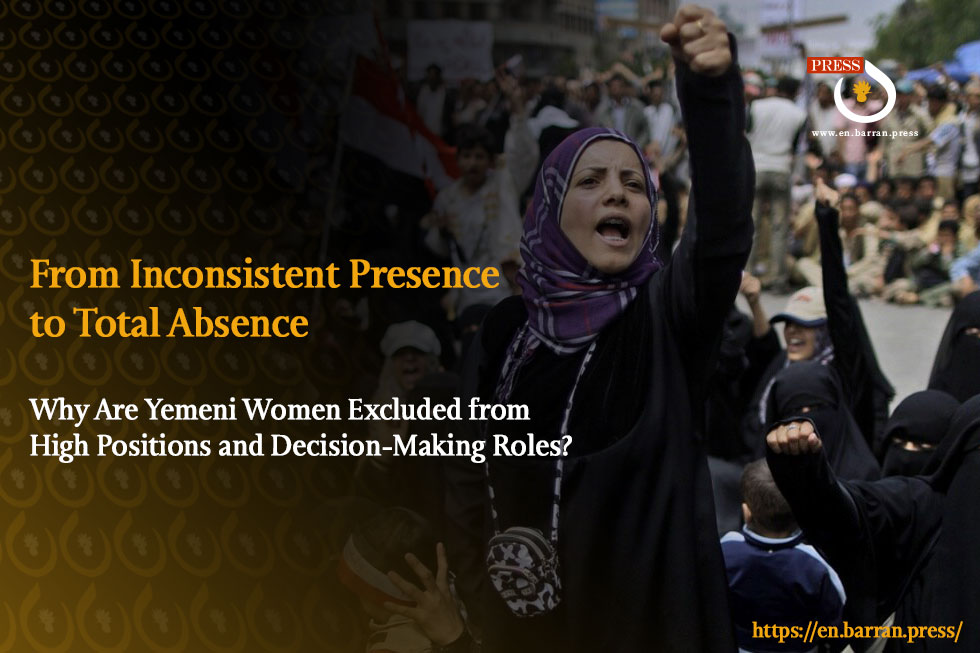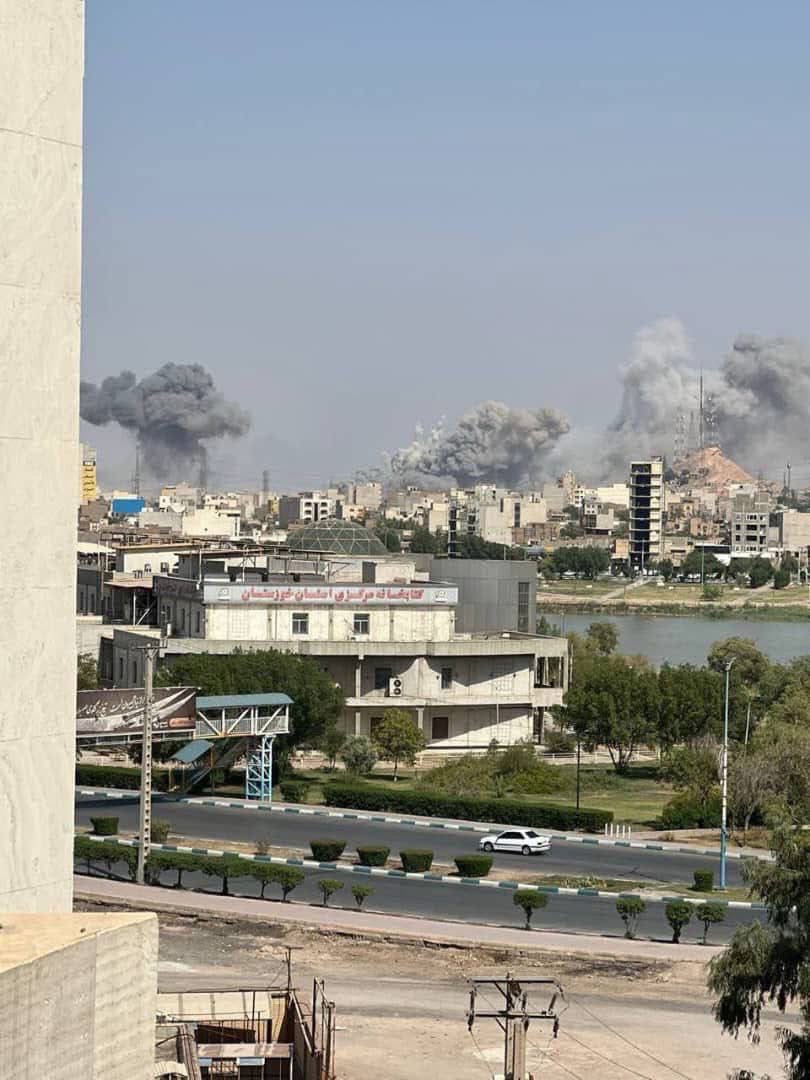
Barran Press - Reports Unit:
Since the outbreak of war in Yemen following the Houthi group's takeover of the capital, Sana'a, in late 2014, Yemeni women have been present in every aspect of the conflict but absent from high positions and decision-making roles.
In addition to sharing the suffering, displacement, and homelessness with men, Yemeni women have emerged as direct victims of the war, either killed, injured, kidnapped, or indirectly affected as mothers, wives, daughters, or relatives of the deceased, injured, or kidnapped.
Women have excelled in facing the war's repercussions and alleviating humanitarian suffering by collecting firewood, fetching water, treating the wounded, transporting the dead, caring for the sick, and cultivating crops. They have led humanitarian initiatives, organized fundraising campaigns, and sold their jewelry and belongings to buy food amid salary cuts and lack of work and income sources—tasks men cannot perform.
Despite all this, women have lost all the rights and gains they had achieved over the past decades since the republic's establishment. Their presence in high government positions and decision-making roles in government and party institutions has declined.
Some attribute women's absence from decision-making to customs and traditions that marginalize women, considering that society, for cultural and religious reasons, tends to prefer men in political work over women.
A Complex Issue
Yemeni academic Dr. Suad Al-Saba said, "Society, due to the ignorance that dominates the minds of both males and females, looks down on women and does not trust their ability to participate in politics or even community participation related to crucial issues."
She added in an interview with "Barran Press" that "even in medicine, they prefer men over women for surgeries, regardless of their capabilities, because they believe women are weak."
She considered this issue "a complex one that requires awareness of human value and a conscience that governs political practices with absolute objectivity, not self-interest."
Strict Restrictions
Since taking control of state institutions and parts of the country by force, the Houthi group has imposed strict restrictions on women, preventing them from working and education, depriving them of reproductive health services, and restricting their travel and movement, even interfering with their clothing, appearance, and voice.
International law professor Abdul Salam Al-Shaibi told "Barran Press" that the Houthi group has restricted women and prevented them from reaching decision-making positions and participating in community, political, and economic activities by imposing several restrictions.
Among these restrictions, according to Al-Shaibi, is "the extremist interpretation of religion to justify marginalizing women and excluding them from public life, thereby restricting their role in society to narrow traditional roles."
He added that "discriminatory sectarian policies" are also among the restrictions, noting that the Houthi group follows "clear policies aimed at marginalizing Yemeni women and keeping them away from decision-making centers unless they belong to the sectarian lineage."
The restrictions did not stop there; the group also imposed "restrictions on education," preventing girls from obtaining higher education in certain fields, limiting their professional development opportunities, while girls from sectarian families study abroad.
Other restrictions include "limiting women's personal freedoms and their ability to participate in social and political activities outside Sana'a under the pretext of needing a male guardian," according to Al-Shaibi.
Not the Time
Lawyer and human rights activist Afra Hariri believes that all parties practice "the same discriminatory act against women," noting that she cannot separate this issue from one region to another.
In her view, this "is not a decision or a legal or constitutional text, but rather an action by the political authority in all Yemeni regions."
Regarding the reasons from the authorities' perspective, Hariri told "Barran Press," "Each justifies it according to what they see in the details, but the final say from all parties is 'It is not the time for women.'"
She added that some attribute it to "ideological, social, cultural, or perhaps political reasons." Regardless of the reasons, she confirmed that "they all agreed to exclude women from decision-making positions."
Cultural Barriers
Lawyer and human rights activist Huda Al-Sarari explained to "Barran Press" the decline in women's presence in high positions and decision-making roles from several angles.
First, "the political and security conditions and the nature of the ongoing conflict in Yemen, which has led to the dominance of security and military agendas at the expense of other priorities, reducing the focus on empowering women or including them in government positions."
In her view, "the focus on appointing individuals with political or tribal influence may be one of the reasons for excluding women."
Despite the advancement of Yemeni society's awareness, Al-Sarari said, "there are still cultural barriers that limit the acceptance of women in leadership positions, especially in political contexts."
She added to "Barran Press" that "the lack of political will in successive governments may not give real priority to women's representation, despite Yemen's commitment to international treaties supporting women's rights." Additionally, "the absence of sufficient international or local pressure to push authorities to include women in government formations."
Another reason for the decline, according to lawyer Al-Sarari, is that "the current political structure is based on quotas between conflicting parties, which may not give women a sufficient share if they do not have strong representation in those parties."
Moreover, "severe economic crises direct priorities towards survival issues, such as providing basic services, leading to the neglect of women's political empowerment issues."
She also mentioned "the absence of strong female representation in negotiations," saying that "women in Yemen have not yet succeeded in building a political pressure bloc capable of imposing their presence in government formations, despite individual efforts and women's organizations."
Legal Right
Legally, Yemeni lawyer Hadi Wardan told "Barran Press" that "the Yemeni constitution was clear on this right, dedicating a special chapter, the second chapter, titled 'Rights and Duties.'"
He explained that this chapter includes a set of legal texts about citizens' rights, primarily that they are equal. He added that Article 41 of the Yemeni constitution negates all forms of discrimination based on gender, class, sect, or faction.
He said that this text is clear and does not exclude anyone, as every Yemeni citizen living in the Republic of Yemen is protected by this law and has the right to participate in political life as stated in Article 2. They have the right to contribute to political, economic, and social life, run for office, vote, and join unions or associations.
He added that these are fundamental articles in the Yemeni unity constitution that grant everyone the right to participate in politics and reach decision-making positions.
Lawyer Wardan confirmed that anyone harmed or prevented from exercising their political right and reaching decision-making positions for partisan, sectarian, gender, or factional reasons has the right to resort to the judiciary and obtain their right according to the constitution and law.
Therefore, he said, "women have every right to reach decision-making positions according to the Yemeni constitution and law."
Women and Governments
"Barran Press" tracks women's presence in Yemeni governments over the past two decades:
-
In 2001, Abdul Qader Bajammal's government was formed, with Yemeni women holding one ministerial portfolio (Human Rights).
-
In early 2006, a government reshuffle in the same government gave women two ministerial portfolios (Human Rights, Social Affairs, and Labor).
-
In 2007, Ali Mohammed Mujawar's government was formed, with women holding three ministerial portfolios (Human Rights, Social Affairs and Labor, Cabinet Affairs).
-
In 2012, the National Reconciliation Government was formed following the youth revolution, headed by Mohammed Salem Basindawa, with women's representation reduced to two portfolios (Human Rights, Cabinet Affairs).
-
In late 2014, Khaled Bahah's government was formed, with women holding three ministries (Social Affairs, Information, Culture). However, this government was short-lived due to the Houthi group's coup and takeover of Sana'a.
-
In early 2015, the country had two governments: one in Houthi-controlled Sana'a and the other in Aden, declared the temporary capital, with women losing all their high positions.
-
In April 2015, Khaled Bahah's government was reformed outside the country, with no female representation.
-
In 2016, Ahmed Obeid bin Daghr's government was formed, with women
-
In 2018, the government of Maeen Abdulmalik was formed, and women kept the two portfolios (Social Affairs and Legal Affairs), before losing them in the government reshuffle in 2020, and all ministries are male.
-
In February 2024, Ahmed Awad bin Mubarak was appointed Prime Minister instead of Maeen Abdulmalik, and the same lineup of ministers continued.





